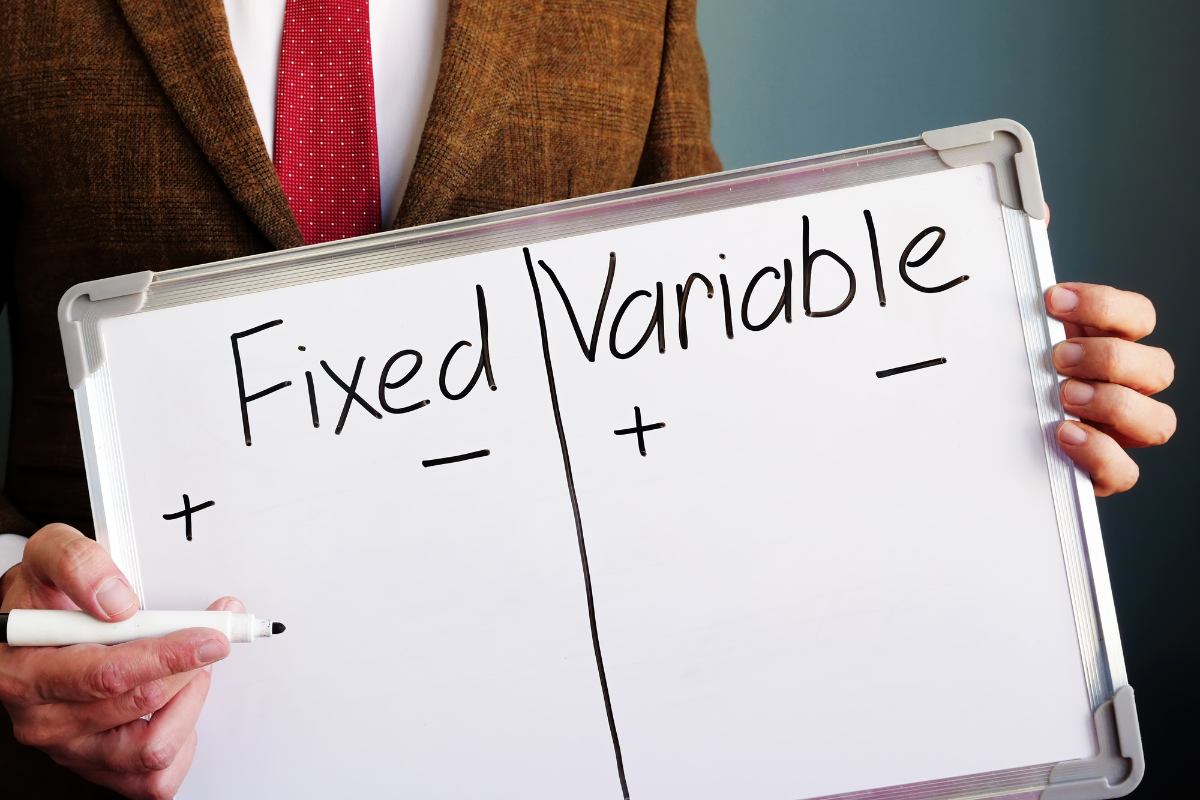Fixed vs. Variable Rate Mortgage: Weighing The Pros and Cons
Whether you’re renewing your mortgage, buying a new home, or making the leap from renting to homeownership, the type of agreement you choose will define your experience.
The two most popular mortgages are fixed and variable rates, each offering pros and cons. While fixed-rate mortgages automatically seem like the best option, variable rates are growing in popularity.
So, if you’re struggling to choose the right mortgage deal for your needs, stick around because we’re about to reveal the pros and cons of fixed and variable-rate mortgages.
What Are Fixed and Variable Rate Mortgages?
When you apply for a mortgage, the lender usually offers fixed or variable terms. Both refer to how your mortgage rate will behave over time, and your choice will impact your monthly payments. It also defines the degree of financial risk you’ll take.
Fixed-Rate Mortgage Overview
A fixed-rate mortgage comes with set interest rates for the entire term. For example, if you receive a 5.94% fixed rate for three years, you’ll pay that exact amount until the set period runs out.
Many people choose fixed mortgages because they’re the stable option. You’ll know what you’ll spend each month without worrying about changing economic situations.
In Canada, the most common fixed-rate terms are:
- 1-year
- 3-year
- 5-year
- 10-year
Your chosen duration will also impact how much you’ll pay each month.
Variable-Rate Mortgage Overview
Variable-rate mortgages don’t come with fixed rates and are known to be unpredictable. The interest rates fluctuate – usually in line with the Bank of Canada’s interest rate, so you might end up paying more or less as time goes on.
Because they’re less stable, variable-rate mortgages are often more affordable initially, and there’s always the chance to save money if the rates decrease.
But, if the Canadian economy experiences a downturn, your mortgage payments will increase.
Most variable-rate mortgages will adjust with the prime rate, which usually happens monthly or quarterly.
Economic Outlook for Mortgage Rates in 2024

We all know that the Canadian housing market has experienced its ups and downs over the past few years. As with most economies, recovering from COVID-19 is an ongoing process.
Before jumping into your decision, it’s important to understand the economic outlook for mortgage rates. We’ll soon be heading into 2025, but the rates could still change in 2024.
Current Market Trends
The 2023 housing market saw plenty of ups and downs, but we went into 2024 with an optimistic (and somewhat hopeful) outlook. Ontario and British Columbia saw the most noticeable positive changes, and 2024 lived up to expectations.
In July 2024, the Bank of Canada reduced its interest rate to 4.5%, signalling positive changes to inflation. We saw these rates decrease to 4.25% in September, and experts believe there could be further positive changes at the end of the year.
While it depends on the economy, most agree that getting a mortgage today is a much more stable decision than it was in 2022 and 2023.
How Economic Uncertainty Could Impact Your Decision
Economic uncertainty impacts people differently, and it really depends on whether you’re open to taking risks. If rate increases are a huge concern, opting for a fixed-rate mortgage gives you peace of mind and more stability.
But – as the saying goes – high risks mean high rewards. If you’re open to some instability, opting for a variable-rate mortgage could mean you save money further down the line.
Pros and Cons of Fixed-Rate Mortgages in 2024
As with all financial decisions, weighing the pros and cons of different mortgages is vital. This not only lets you evaluate your options but also ensures you make a decision that suits your immediate and long-term financial objectives.
Let’s explore the pros and cons of fixed-rate options.
Pros of a Fixed-Rate Mortgage:
- Rate Stability: Fixed-rate mortgages offer stability, as you’ll always know the monthly payments. There are no nasty surprises or shock charges.
- More Protection: As covered previously, the Canadian economy directly impacts mortgage rates. Fixed-rate mortgages mean you don’t have to worry if the economy experiences a downturn.
- Peace of Mind: A fixed-rate mortgage provides financial certainty and can save a great deal of anxiety. If you prefer peace of mind, fixed rates are worth your consideration.
Cons of a Fixed-Rate Mortgage:
- Higher Initial Rates: Fixed rates usually start higher than variable rates, so you might end up paying more in the early years. Remember, you’re paying for peace of mind.
- Missed Savings: As we’ve seen in 2024, the BoC’s interest rates have changed significantly. People on fixed-rate mortgages can’t take advantage of lower rates.
- Breaking the Mortgage: Fixed-rate mortgages often have higher penalties if you need to break your contract before the term ends.
Pros and Cons of Variable-Rate Mortgages in 2024
Variable-rate mortgages aren’t for everyone, but they offer plenty of advantages. At the same time, there are downsides you’ll need to consider. Let’s explore them now.
Pros of a Variable-Rate Mortgage:
- Potential Savings: The best thing about a variable-rate mortgage is that you’ll save money when the rates fall. While these savings might not be much initially, they add up over time.
- Flexibility: If you want to leave a variable-rate mortgage early, the exit charges will probably be lower.
- Historically Cheaper: Over time, variable rates have often turned out to be cheaper than fixed rates. Of course, this depends on the economic situation.
Cons of a Variable-Rate Mortgage
- Uncertainty: You won’t get much warning if the rates go up, which makes budgeting tougher.
- Rate Hikes: When the rates are stable, that’s great…but what happens if they increase? Getting a variable-rate mortgage without understanding long-term implications could cause financial issues.
- Stress: Managing a variable-rate mortgage means keeping a close eye on the economy and being ready to adjust your finances if needed. Some people find this too stressful and are happy to pay more for peace of mind.
How to Choose the Right Mortgage in 2024
Whether a fixed or variable mortgage suits your needs depends on personal preference. Think about the following factors when making a decision.
Assess Your Risk Tolerance
Are you happiest when you can plan ahead? Or are you more about taking risks? Knowing your tolerance levels can help you make a decision.
Fixed-rate mortgages are more stable, but you could potentially save money with a variable-rate mortgage (if the interest decreases).
Look at Your Financial Situation
It’s also important to consider your financial situation. If you’re on a restricted budget or have an inflexible income, a fixed-rate mortgage might be best.
However, variable mortgages can be beneficial if you have the flexibility to handle potential rate increases.
Plan for Different Economic Scenarios
What would happen if mortgage rates rose dramatically? Would your bank balance survive? If even a small rate increase would cause financial problems, it’s probably best to stick with fixed-rate mortgages.
Of course, if the rates fall and you’re on a fixed-rate mortgage, you won’t be able to access these savings.
Consider Your Life Stage
Your life stage and future plans should factor into the decision. Are you planning to stay in the same house for a long time? Or are you a first-time buyer using the property as a step onto the ladder?
As fixed-rate mortgages are harder to leave, they’re usually best if you have long-term plans. Variable rates can offer more short-term flexibility.
Discover Mortgage Options With a Victoria BC Mortgage Broker

Choosing a mortgage can seem like you’re swimming against the tide. From assessing your eligibility to choosing interest rates and making your application, there’s a lot to consider.
Working with a dedicated Victoria BC mortgage broker can help you access the best deals for your needs.
Speak to a Mortgage Broker or Financial Advisor
Prime Mortgage Works has access to a network of lenders offering fixed- and variable-rate mortgages. Our dedicated mortgage brokers support you from the initial consultation to signing your agreement.
Stay Informed About Rate Changes
Knowing what’s happening with the property market means you can act quickly. We do the hard work for you, so all you have to do is stay updated through our blog. Check back regularly for the latest rate changes.
Use Online Mortgage Calculators
Feel like you’re trying to feel your way around in the dark? Find out how much you could borrow and look at different rate scenarios with our online mortgage calculators. It’s the stress-free way to see how changing interest rates could impact your payments.
Ready to find the perfect mortgage? Please apply today, and we’ll get back to you.


